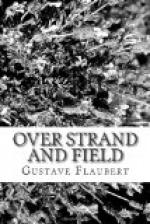All four of us returned to the city together, which afforded us the opportunity of again admiring mother of the harmonious combinations of Providence which had created this commissaire de police for this garde-champetre and this garde-champetre for his commissaire de police. They were made for each other. The same fact would give rise in both of them to the same reflections; from the same idea both would draw parallel conclusions. When the commissaire laughed, the garde grinned; when he assumed a serious expression, his shadow grew gloomy; if the frock-coat said, “This must be done,” the jacket replied, “I think so, too;” if the coat added, “It is necessary;” the waistcoat affirmed: “It is indispensable.” Notwithstanding this inward comprehension, their outward relations of rank and authority remained unchanged. For the garde spoke in a lower tone than the commissaire, and was a trifle shorter and walked behind him. The commissaire was polished, important, fluent; he consulted himself, ruminated, talked to himself, and smacked his tongue; the garde was deferential, attentive, pensive and observing, and would utter an exclamation from time to time and scratch his nose. On the way, he inquired about the news, asked the commissaire’s advice, and solicited his orders, while his superior questioned, meditated, and issued commands.
We had just come in sight of the first houses of the city, when we heard shrieks issue from one of them. The street was blocked by an excited crowd, and several persons rushed up to the commissaire and exclaimed: “Come, come quickly, Monsieur, they’re having a fight! Two women are being killed!”
“By whom?”




